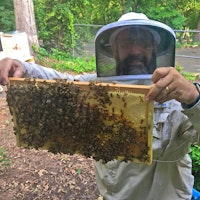Keep You and Your Family Safe from Ticks this Summer
Discovery Place Nature
It’s summer and time for all of us to get outside and enjoy the great outdoors. Even though we’re enjoying the fun of hiking, playing and exploring the woods around our homes, on vacation, in parks and in summer camps, there are some risks that are a part of being outside.
One of those risks is coming in contact with ticks. Ticks are related to spiders, scorpions, and mites, and are not insects. In North Carolina, we have the possibility of running into about five species of ticks. However, here in the Piedmont region, the most common tick is the Lone Star tick. You can still come across the less common Dog Tick and Wood Tick.
Many diseases can be transmitted through tick bites. Here are some tips to avoid getting sick:
- Learn where ticks are found. – Ticks can be found in grassy areas, wooded spaces, brush, etc. Camping, hunting and exploring can put you in areas where ticks are more likely found.
- Check yourself and your family. – When you come in from the outside, whether it’s after a short hike or a weekend at a campsite, make sure you check yourself, your family, your gear and your clothing for ticks. Check areas like your underarms, the back of knees, your belly button, behind the ears, your scalp and other hidden areas for ticks. Take a shower after being outside to dislodge unattached ticks.
- Use repellent. – Using a good repellent on your clothing and skin can lessen your chances of getting bit by a tick. There are some natural repellents but the most effective repellents contain DEET, picaridin, IR3535, Oil of Lemon Eucalyptus (OLE), para-menthane-diol (PMD) or 2-undecanone. You can treat your clothes with some while others are approved to put directly on your skin. Make sure you read the directions before applying.
Don't let ticks keep you from getting out and enjoying the outdoors. A little preparation, awareness and observation is all that is needed to make sure you can enjoy your summer to the fullest!

